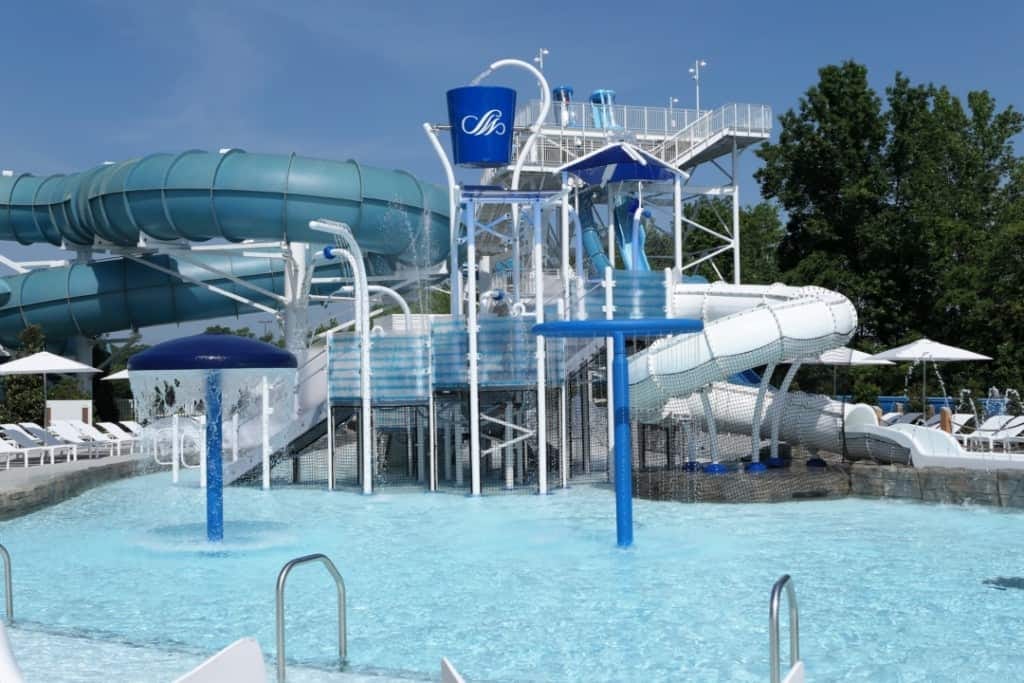Enjoy Your Pandemic Waterpark
A corporation deigns to let taxpayers into a previously private park they paid for.

This is Boondoggle, the newsletter about corporations ripping off our states and cities. If you’re not currently a subscriber, please click the green button below to sign up. Thanks!
Back in 2017, Nashville, Tennessee, provided Ryman Hospitality with about $13.8 million in tax breaks to build a waterpark at its Gaylord Opryland Resort & Convention Center, which is managed by Marriott. However, locals weren’t able to access the park. Instead, it was for the exclusive use of hotel guests.
Today, with the coronavirus pandemic decimating the travel industry, leaving hotels everywhere desperate for revenue, the company has deigned to allow locals to use the attraction they subsidized. But only through September 3, and at a cost of nearly $50 per person per day.
This is a perfect example of a city’s leaders making a bad economic development call and then asking the city’s taxpayers to bail them out.
The initial idea behind subsidizing the waterpark was to juice Nashville’s convention business, enticing families to come and stay a few days in the city beyond the convention itself. But chasing conventions is a sucker’s game.
There’s a long history in the U.S. of cities building convention centers and then deciding they need to be even bigger and better to keep up with those being built in other cities. Kansas City, for example, opened a center for the 1900 Democratic national convention, and by the 1920s business leaders were clamoring for a new one because “We are gradually being eliminated from consideration through the lack of two important civic facilities now possessed by virtually all of the larger cities in the country … One is dining and meeting space in hotels … and the other is of course the lack of a convention hall with which to care for larger gatherings.”
To this day, city leaders still think hosting more conventions is a way to get a guaranteed economic boost. But there are only so many big meetings to go around, so cities literally have to steal them from each other in order to make the math work. For instance, the high point for D.C.’s underwhelming, publicly-funded convention space between 2003 and 2010 was 2005, when several meetings had to move out of a Hurricane Katrina-ravaged New Orleans.
Instead of opting out and finding more sustainable ways to build local economies that don’t necessitate robbing other cities, politicians use this competition to justify a never-ending convention center arms race. For Nashville, this meant building a waterpark.
Now, of course, the pandemic has halted the big meeting business entirely, leaving cities with convention centers that won’t be hosting any conventions, but that still need to be paid for. I’m not sure I could think of a more insulting move than to provide Nashville taxpayers with a short window in which they can pay through the nose to access an attraction they already subsidized based on an economic theory that was half-baked. And during a still-active pandemic, no less!
Nashville, like other Tennessee cities, is simply too reliant on corporate tax incentives. According to its most recent financial statement, it has 12 active property tax reduction deals with big companies, including Dell and Bridgestone, which cost it nearly $9 million last year. Per the disclosure, “None of these agreements include a provision for the recapture of abated taxes in the event an abatement recipient does not fulfill the commitment it makes in return for the tax abatement.” So if the companies don’t fulfill their end of the deal, well, too bad.
As current Nashville Mayor John Cooper, who opposed the waterpark deal while on the city council, put it at the time, “Every time that we need something in the future for our districts — a reading instructor for children, a police man, a body camera or a stormwater drain — you will know where to find it. You will find it in an Opryland swimming pool."
That’s exactly right, and describes how too many places across the U.S. operate: Giving corporations whatever they want, while the stuff taxpayers really need goes unfunded. In this instance, all Nashville got was a few days for taxpayers to play on waterslides — as long as they buy a ticket.
Big thanks to Dan Fitzpatrick for tipping me off to this story.
One more thing: Speaking of Tennessee, in my book I explained how Memphis taxpayers have plowed tons of money into the Memphis Pyramid, a literal pyramid on the Mississippi River that has been a basketball arena and a concert venue, and is now a massive Bass Pro Shops. Due to the pandemic-related drop in tourism, and therefore sales tax revenue, the city may have trouble paying off bonds linked to the district in which the pyramid sits. Maybe a pharaoh cursed this place or something?

Thanks for reading this edition of Boondoggle. If you liked it, please take a moment to click the little heart under the headline or below. And forward it around to friends, family, or neighbors using the green buttons. Every click and share really helps.
If you don’t subscribe already and you’d like to sign up, just click below.
Finally, if you’d like to pick up a copy of my book, The Billionaire Boondoggle: How Our Politicians Let Corporations and Bigwigs Steal Our Money and Jobs, go here.
Thanks again!
— Pat Garofalo


